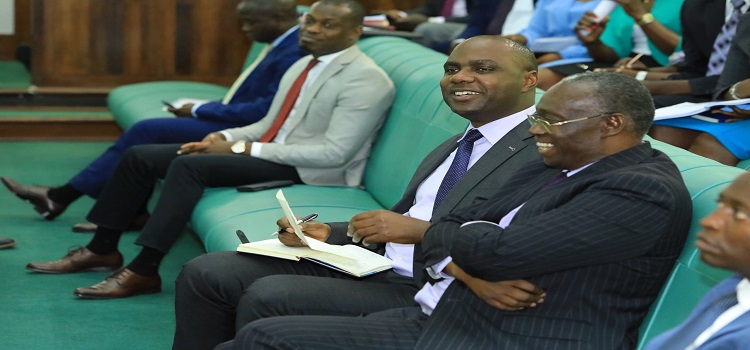Parliamentary committee on National Economy directed to assess Uganda’s public debt
According to the minister of state for finance, planning and economic development (General Duties) Henry Musasizi, composition of public debt stock as at end of June 2023, was Shs86.7 trillion.

Concerns on the increasing public debt burden continue to dominate debate and this time, Deputy Speaker, Thomas Tayebwa has directed the committee on National Economy to make an assessment on the country’s public debt and report back to Parliament.
Tayebwa made the directive during the debate on the national budget framework paper for financial years, 2024/2025 – 2028/2029 (NBFP) on Tuesday, January 30, 2024.
According to the minister of state for finance, planning and economic development (General Duties) Henry Musasizi, composition of public debt stock as at end of June 2023, was Shs86.7 trillion.
Tayebwa gave the committee on national economy one month to make an assessment on the public debt to allow the legislators debate the matter.
“It is an issue which we can come here and debate and they give an argument where they base themselves. I have interacted with speakers of other countries, and surprisingly, they say our debt is sustainable compared to theirs,” said Tayebwa.
The Deputy Speaker’s directive followed a call by Butambala county Member of Parliament, Hon. Muwanga Kivumbi who urged parliament to spare time, specifically to tackle the increasing burden of public debt.
Muwanga said that Uganda is on the verge of getting black listed for failure to repay debts.
“We are going to be debt refinancing this financial year by a whooping Shs9 trillion. Interest is going to increase on our domestic debt by a whopping Shs1 trillion,” he said.
He added, “we need to sit because if we don’t, we have fundamentally mortgaged this country to a level we cannot imagine. We need to crack this animal called national debt and the way we are borrowing; otherwise we are in a deep hole.”
Nyendo Mukungwe Member of Parliament Mathias Mpuuga faulted the Minister of Finance for failure to lay a public debt management framework, which he said is a requirement under the Public Finance Management Act.
“We need to understand how you will manage the public debt. The law demands that the minister lays this framework immediately after laying the charter of fiscal responsibility,” Mpuuga said.
Hon. Hassan Kirumira (NUP, Katikamu County South) also called on the Minister of Finance to furnish parliament with the details of lenders, to enable lawmakers make informed recommendations.
“If we do not do this at this stage, we will find ourselves in a state where we will suffer a loss because of lack of planning. We agree on borrowing but we need to be precise on the source of borrowing, terms and conditions of money lenders,” said Kirumira.
The lawmakers also tasked the Ministry of Finance to prioritise payment of domestic arrears which as of 30 June 2023, stood at Shs2.7 trillion.
The Leader of the Opposition, Hon. Joel Ssenyonyi questioned why the government puts more focus on repayment of external debts and yet the domestic arrears are owed to local suppliers who form the majority of taxpayers.
“Locals employ youths, their businesses are closing and the entire economy suffers and yet we focus on investors. Let us get serious,” Ssenyonyi Said adding that, “once people provide goods and services to you and you have not paid them, you owe them, it is a debt.”
In the 2024/2025 financial year budget, the Ministry of Finance has allocated Shs200 billion to clear part of the Shs2.7 trillion, which Ssenyonyi said is insufficient.
Musasizi said that whereas the Ministry of Finance is committed to reducing the domestic arrears, they are limited by the available resources.
“We have a commitment as a ministry that at least on an annual basis; we as much as possible try to reduce them [domestic arrears]. I wish we had all the resources to settle the Shs2.7 trillion at ago. The spirit is there but what is limiting us is the resources,” said Musasizi.
The Chairperson of the Budget Committee, Hon. Patrick Isiagi however, said that it is unfortunate that the government is still grappling with domestic arrears even after instituting a commitment control system where orders are placed if funds are available.
“Accounting officers commit according to work plans but at the end of the day, the Ministry of Finance does not release funds,” Isiagi said.
The NBFP, which is government’s overall strategy document for the budget, and provides the link between government’s overall policies (identified in the National Development Plan) and the annual budget was presented by the Minister, Musasizi, during plenary sitting on Thursday, 25 January 2024.
The 2024/2025 resource envelope is projected at Shs52.7 trillion.







